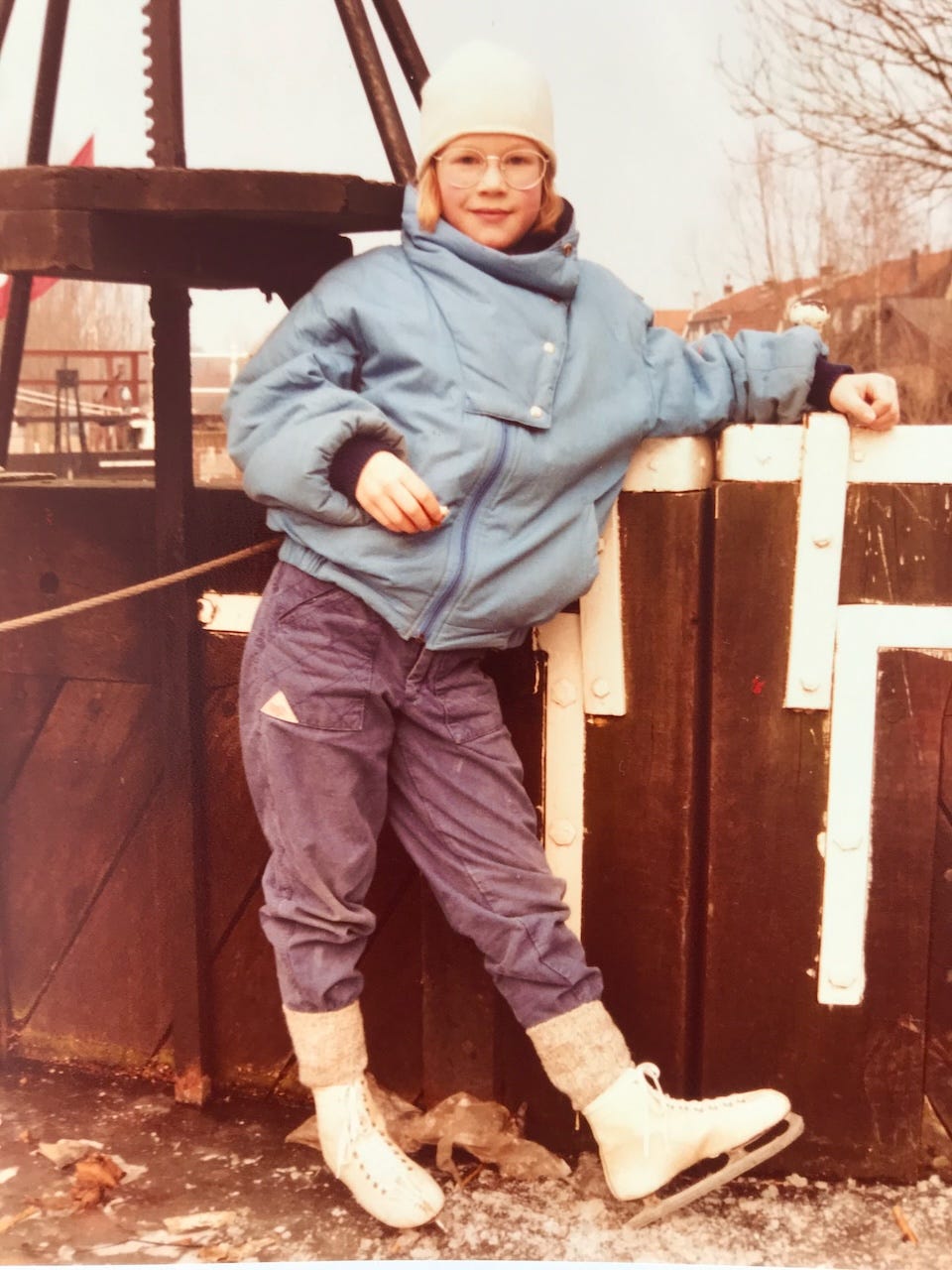🖇️ Life-Changing Advice from a Literary Agent: Break Down the Wall
On self-erasure, authenticity, and connecting with readers
Dutch Coffee
“There’s a wall between you and your writing,” my literary agent in Amsterdam told me over a cup of strong Dutch coffee at her kitchen table.
I was twenty-seven and had just finished my first novel. She was near the end of her career and had brought Don DeLillo and Paul Auster to Dutch audiences.
“What wall?” I asked.
I’d given myself completely to my story, or so I thought. I’d carried my flawed characters through escalating troubles until they changed in ways neither they nor I had foreseen. I’d written about betrayal and sex, the intimacy and complexity of female friendship. What more did she want?
“There’s something you don’t allow us to see,” said my agent.
Did she mean I had to write more interiority? Share my characters’ thoughts and feelings more directly? But I liked it when not everything was spelled out, when emotions revealed themselves through action and evocative descriptions.
My agent couldn’t pinpoint what she was missing exactly. She just sensed I was holding out, holding back. Only I knew what I left unsaid. Her advice to me was clear: Break down the wall.
Lived Experiences and Genuine Responses
I thought of that wall while writing my second novel and began to see what she meant. My writing wasn’t bad, but it lacked what I admired in the works of my favorite authors: a level of veracity and vulnerability. Here I was, a young woman with a complex emotional life plagued by daily neuroses, and here was my fiction, written by a philosophy major who wanted to enter the Noble World of Literature. I had erected a barrier between myself and my writing, because I believed my feelings had no place in high art, that my personal experiences were not to interfere with my work if I wanted my books to matter. Writing serious literature, I thought erroneously, was self-erasure.
But I learned that the kind of books I loved and wanted to write required the author’s presence. Not as a strong ego seeking praise and attention, but as a human being whose lived experiences color her work. It’s in our genuine responses to life that meanings are made—and found. It’s in how we react to the world that we become real.
Authenticity can be like a thread of connection between author and reader. And this is true in memoir as well. Whether the genre is fiction or nonfiction, a reader enjoys meeting an author on the page they can trust. A person who speaks from some kind of inner truth.
When I use my personal experiences in my writing, my stories gain the potential to become something universally shared. It’s through my idiosyncrasies that my stories come to life.
Brick by Brick
I’m not the sledgehammer type. Breaking down the wall between me and my writing meant doing so brick-by-brick.
Because I had trouble staying true to myself when working on a novel, I began writing other texts on the side: flash fiction, speculative fiction, personal essays, magazine articles, or pieces such as this one.
I also switched to writing in English. Dutch was my mother tongue, I lived in Paris and spoke French, but married to an American and working at home, English had become the language in which I communicated the most. Although it was daunting to write in English, it liberated me from trying to impress others with my prose. I would never be a poetic genius in a foreign language—I wasn’t Nabokov—so instead, I focused on clarity and voice. I dug deeper into myself and released the thoughts and feelings I considered too dark to express in daily life. Or too weird.
The more freely I wrote, the more my writing became real, and the more it resonated with readers. And with professionals in the American literary world. It was after years of experimentation that I connected with my current agent and signed a book deal with Simon& Schuster for A Whale in Paris.
Nowadays, I ask myself first what the story I’m working on means to me. Not to the world or my smart potential reader, but to me, whoever I am at the time. Only if I react to the story first can I ever hope to touch others with my writing. Only if I keep the wall down, will my writing have the chance to ring true.
The essay above was first published last Friday in a slightly abbreviated version by Brevity—thank you, Dinty Moore!
What inhibitions did you have to overcome in your field of work? Please share your story in the comments and let others know how you forged ahead.
Author News: Recent Publications ( 4 ! )
I’ve been busy and lucky and have some news to share.
1. Column in Slate
Last Sunday, Slate published my column How I Learned to Love Minimizing My Possessions.
“Downsizing my belongings was hard. I felt ridiculously attached to things I hadn’t used in years. A sleeping bag from my teenage camping days. A wooden chess set from a college trip to Prague. A pair of silver boots meant for a New Year’s Eve party in Los Angeles (I never wore them afterward). I feared I’d lose part of myself if I threw these things away. Gone would be my first kiss, my intelligence, my wild side.”
When I pitched this idea for their One Thing column, I heard back the next day—so great! This is my first piece for Slate and was hard to get right, but I’m happy with the result.
Please go to the Slate website to read the whole column.
2. Prose Poem for the Where-I’m-From Series
Yesterday, I did on Live Instagram event with Alyson Shelton who edits the Where-I’m-From Series. I read aloud my prose poem “Where I’m From,” and spoke with her about dolphins, the names of our dead—Michael and Hans—and the night as a lens.
“I’m from water and winds, reclaimed lands enclosed by dikes, feeling safe below sea level; spring storms were my lullabies and winter ditches my paths to skate to school.”
I wrote this piece because the editor, Alyson Shelton, asked me to and I found the series fascinating.
Please go to Instagram or YouTube to see the video or read the full poem.
3. Guest Post for Becky Tuch’s Lit Mag News
Today, Becky Tuch from Lit Mag News published my guest post Writing Wildly: How to Turn Experiments into a Cohesive Book.
What I mean by writing wildly is that I wrote without knowing what purpose the story might serve in the long run. I had no end goal. I wasn’t writing toward a collection. I was writing to see what I could do and how what I did affected others. By expressing myself freely, I was discovering what I had to say.
In this post, I write about my forthcoming flash fiction collection Woman of the Hour: Fifty Tales of Longing and Rebellion (Vines Leaves Press, July 2025) and how this book came together.
Please head over to the fantastic Lit Mag News to read the guest post.
4. Flash Fiction for Fiction Attic Press
Two weeks ago, Fiction Attic Press published one of my flash fictions: “What She Really Wants to Know.”
“Ten days after she read about the robbery in the local newspaper and one week after Bart’s arrest, Irma unlocks his front door with the key the attorney sent her by mail. Her throat feels pinched. Although they’re neighbors, Irma and Bart weren’t close. They never even exchanged keys in case of emergency.”
Fiction Attic Press has been publishing excellent short fiction online and in print since 2005. They now also have a newsletter on Substack. Thank you, editor Michelle Richmond, for publishing my work.
My story is behind a paywall, a kind of wall I respect and won’t break down. If you want to read this story, you can either subscribe to Fiction Attic Press or upgrade your subscription to the paid version of my newsletter. I’ll send this story to my paid subscribers soon.
Time to Say Goodbye
I’m still in Bracciano, Italy, still eating porcini whenever I can. Next week, I might write about a private palazzo in Rome, Viterbo’s sleepy charm, or something else entirely. You’ll have to be patient to find out.
All my best,
Claire
P.S. If you find my writing on Substack and elsewhere valuable, please consider supporting my work. Here are some ideas for people who don’t want to become a paid subscriber.
Hire me as your editor, writing coach, or online workshop teacher
Hire me as your copywriter or ghostwriter
Purchase my novel A Whale in Paris (Simon & Schuster)
Purchase an international eSIM or VPN plan through my affiliate links (and learn who my preferred providers are)
Purchase one of the books I truly love from my bookshop
Recommend Wander, Wonder, Write to others
Invite me for an interview, podcast, guest post, or other collaboration
Share my writing in your notes or on other social media platforms
Leave a comment
Like a post or two
Asking for support feels super awkward, yet it’s another thing book professionals recommend we authors do—I’m trying to learn the skill.







A great description of a journey....And so glad about the publications!
Claire! Your flurry of submissions paid off! Congratulations! Love the one that made it into Slate especially. Yay!